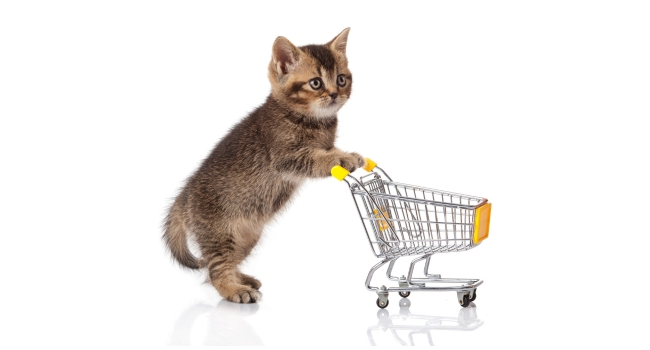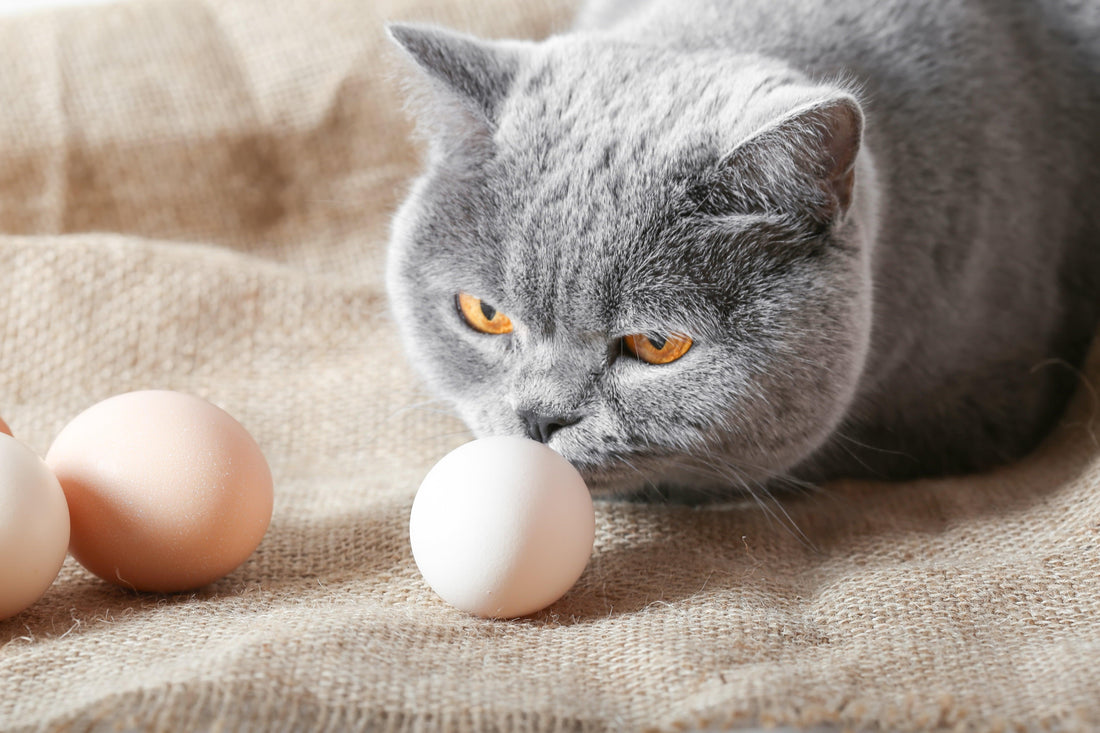Feeding cats is more complex than you think and cat owners can come across dilemmas such as can cats eat eggs? They might give their cat an egg thinking it is harmless, but are eggs safe for cats?
You might also be curious as to whether or not a cat should eat eggs. There's no need to worry, this guide has all the information you need.
By the end of this article, you’ll be able to confidently determine whether or not your cat can eat eggs and whether that egg treat is really a treat or a hazard.
Let’s dive in!
Nutritional Profile of an Egg
Eggs are a complete protein because they contain all of the essential amino acids. The egg also contains many vitamins and minerals, including high levels of Vitamin D, B2, B12, riboflavin, selenium, and zinc.
Following are the nutritional values of one large, hard-boiled egg as determined by the United States Department of Agriculture:
One large and hard-boiled (100g) egg:
- Energy 155kcal
- Protein 12.6 g
- Total fat 10.6 g
- Ash 1.08 g
- Carbohydrate 1.12 g
- Sugars 1.12 g
- Fiber 0 g
What are the Benefits of an Egg?
- Animal Protein
For obligate carnivores that lack the enzymes to digest plant proteins or dairy products, eggs provide an essential source of protein.
- Animal fat
Fat makes a good energy source for your cat and eggs are very rich in fat.
- Vitamin A
This vitamin helps maintain the health of your cat's skin, fur, heart, and nervous system. It is also useful for protecting night vision and boosting the immune system.
- Vitamin D
It is essential for bone growth and calcium absorption in the body. Cats do not produce this vitamin on their own.
- Vitamin E
In addition to being an essential vitamin for cats, vitamin E is a powerful antioxidant that protects against cell damage.
- Amino Acids
Cells are made up of protein and the building blocks of protein are amino acids. A cat needs 11 amino acids of which 10 are found in eggs.
- Zinc
Your cat's skin, hair, and reproductive system will benefit from this nutrient.
- Biotin
In addition to supporting thyroid and adrenal gland function, cats need biotin to metabolize protein. It may also improve skin and coat.
- Vitamin B12
This is a vital vitamin that helps support the immune system, digestive system, and nervous system.
- Thiamine
For high-energy organs such as the brain, this nutrient supports carbohydrate metabolism.
- Iron
A cat's diet must contain this nutrient to keep its red blood cells healthy. If it's not present, your cat may become anemic.
- Selenium
Cats' cells are protected from free radical damage by this powerful antioxidant.
- Vitamin B2
Commonly known as Riboflavin, it is responsible for red blood cell production and antibodies to fight diseases in cats.
- Taurine
Only animal proteins contain taurine, which is necessary to maintain a healthy heart, digestion, and vision. Adding eggs to your cat's diet is a great way to increase taurine levels since cats cannot produce it themselves.
- Very low in Carbs
Eggs, which are made entirely of animal protein, contain very few carbohydrates. The dietary needs of cats are low in carbs, so eggs--which contain none--can provide pure protein.
Are Eggs Nutritious for Cats?
It is likely that above all the nutrients will assist cats' organs in functioning properly. Unfortunately, there is no hard scientific evidence that an egg will provide your pet cat with enough vitamin and mineral cocktail.
Since meat contains all the essential micronutrients, it is best to stick to a meat-based diet and use eggs only occasionally.
Can Cats Eat Raw Eggs?

Eggs are a great source of protein for your cat, but they need to be cooked first. Raw egg whites contain a protein called avidin, which can inhibit the absorption of biotin, an important nutrient for cats.
When the egg white is cooked, there is significantly less avidin and it is safe for cats to eat it. Your cat might not like the taste of raw eggs either and will most likely refuse to eat them without coaxing.
Raw eggs may have bacteria such as Listeria and Salmonella, which are harmful to the health of your cat.
1. Listeria
The symptoms vary depending on the severity of the disease, which can be anywhere from mild to severe.
Some signs of a mild case include:
- Lethargy
- Fever
- Diarrhea
- Nausea
If it progresses further, it can develop into muscle pain, breathing issues, pregnancy complications, or even death.
2. Salmonella
Raw eggs can contain Salmonella which can cause severe gastrointestinal problems in cats. Eating raw eggs may also be linked to life-threatening complications.
Your cat may experience the following symptoms if it eats a raw egg containing Salmonella:
- Fever
- Decreased appetite
- Vomiting
- Diarrhea
- Severe dehydration
- Rapid weight loss
Cats with any of the above symptoms should be taken to the vet as soon as possible and should not be eating anything before the examination.
Can Cats Consume Egg Whites?
Egg whites are rich in protein but low in fat, which is beneficial for your pet's diet.
They can be fed in moderation, as long as you do not exceed 1-2 eggs per week and there are no food allergies or sensitivities to eggs.
When it comes to eating eggs, it is important to note that cats and humans have drastically different digestive systems.
It means that if a cat consumes too many eggs at one time it will be more difficult for its body to process the protein and this can lead to dangerous conditions.
Can Cats Eat Eggs Yolk?
Do not give egg yolk to cats because they contain most of the calories, fat, and cholesterol. Due to a high amount of cholesterol, and fat, the egg yolk could damage your pet's well-balanced diet and health.
Is it Safe to Feed Eggshells to a Cat?
Eggshells can occasionally be fed to your cat by grinding them into a fine powder and mixing them with its food. To prevent any potential risk of infection from raw eggshells, it's important to first boil them and get rid of any bacteria.
Eggshells contain high amounts of calcium which are vital to your cat's bone and muscle health.
Can Kittens Eat Eggs?
Kittens generally have the capability to eat eggs, but they need a balanced and complete diet to grow.
Therefore, eggs shouldn't be their only source of nutrition. Kittens should not eat raw or uncooked eggs because they may contract salmonella.
Be sure to check with your veterinarian before feeding your kitten eggs.
Is an Egg a Proper Diet for a Cat?

Eggs can be given as supplemental food, but they should never be used as a main meal. A healthy, balanced diet is best for cats and they should never be given eggs regularly.
Adult cats need around 150-200 calories each day. Just one whole egg (50g) would add around 78 calories to a cat's daily calorie consumption, so even just one would be too much.
Eggs should never comprise more than 10% of your cat's nutrition per day. You should feed eggs by mixing with another protein source like tuna or chicken.
There should be no substitute for a well-balanced diet for your cat, and eggs should only be given as an occasional treat.
A few small pieces of an egg should be offered to cats once or twice a week rather than a whole egg.
Feeding Eggs to Cats: Precautions
One consideration is that eggs have high caloric content and, depending on the size and age of the pet, might not be suitable for every cat, even for cats that live indoors.
Eggs are high in fat and cholesterol. These things may not be bad for humans, but they could put your cat at risk for health problems like obesity or heart disease.
Cats with obesity or kidney issues shouldn't consume egg yolks because they have high amounts of fat and cholesterol.
Occasionally, a cat may enjoy an egg white as well. Speak with your vet to find out how much food to feed your cat.
What’s the Best Way to Give Your Cat Eggs?
Boiling, poaching, scrambling, or frying eggs is the best way to feed eggs to your cat. Raw eggs are not good for them as they may contain bacteria that can cause illness and even death in cats.
Ingredients such as cheese, garlic, and onions that are found in some recipes for eggs should be avoided, as they are poisonous to cats.
Always offer a small quantity of eggs at a time and be sure that you're getting enough fresh water available to your pet too.
It's also important to note that some cats may have an allergy to certain types of protein, so always monitor their eating habits if you suspect this might be the case.
Which Cats shouldn't Eat Eggs?
Eggs should not be consumed by cats with chronic diseases. Even though they may not show any symptoms at the beginning, they might eventually become severely ill because of their ingestion of eggs.
Eating eggs in large amounts can aggravate several illnesses, including:
- Diabetes
- Pancreatitis
- Heart problems
- Obesity
- Liver disease
- Hyperthyroidism
- Urinary tract infections
- Pre-existing digestive problems
Healthy cats are sometimes allergic to eggs and could get vomiting and diarrhea. If you're not sure if your cat can eat eggs, consult with your vet.
What is the Alternative to Eggs for Cats?

There are several alternatives for eggs out there that can keep your feline buddy just as pleased as regular canned or dry food would.
If you're looking for healthy snacks for your cat that go beyond regular canned or dry food, you might want to look into these.
- Chicken
- Lean beef
- Lamb
- Mackerel
- Shrimps and prawns
- Salmon
- Sardines
- Tuna
However, it is important to note that some foods should not be given to your cats such as onions and garlic, grapes, and alcohol.
If you have any questions about what food you should give your cat or how much food they need, consult a veterinarian.
Key Takeaways
- Cats can eat eggs in moderation and as an occasional snack.
- Cats with certain medical conditions shouldn't ever eat eggs because eggs can cause health problems.
- Raw eggs can cause food-borne illnesses, so you should only feed your cat fully cooked eggs.
- Speak with your veterinarian before giving your kitten or cat eggs to eat.
Importance of Pet Insurance
Pet insurance is a great way to protect your animal's health. It can be hard to predict when an accident will happen, but with pet insurance, you're covered.
There are a few different types of plans depending on your needs, and it only takes minutes to get coverage for your pet.
Some pet insurance companies will even cover 100% of veterinary expenses. So make sure to choose the best pet insurance plan for your furry friend.
Once you have a plan in place, vet bills will never be too high because they'll already be covered by the policy.
It's important that we all take care of our animals' safety and well-being so they can enjoy their lives just as much as we do ours.
What Makes Genius Litter Different From Ordinary Litter?

Say goodbye to hauling heavy bags and hello to easy Genius Litter.
With our innovative non-clumping litter formula, you'll need less of it. One bag of our disposable Genius Litter lasts up to a month, so you won't need to refill the box as often and can save money on monthly costs.
One thing that separates us from traditional litter is that Genius Litter changes color to indicate when your cat has a potential health issue, so you can get them help before it becomes an urgent medical situation.
All you need to do is set up a delivery date with us each month, and rest easy knowing that Genius Litter will arrive at your doorstep every 30 days.
For a convenient solution for your cat, try Genius Litter today!
Why Is Lysine So Important For Your Pet?

Protect your pet's immunity!
Have you noticed that your cat is coughing, sneezing, and having rapid breathing? Or maybe he/she has been scratching more than usual?
These are all signs of a weakened immune system. One way to prevent this from happening is by using lysine supplements.
Lysine plays a key role in your pet's immunity because it helps to regulate the immune system.
Without enough lysine, your pets will be more susceptible to illness because their immune system can't fight off infections as efficiently.
When they are sick, they will also be less able to absorb nutrients and make use of other supplements that can help them feel better.
Give your pet the support they need. Our Lysine supplement provides essential amino acids to help support a strong immune system.
Order now to get 300 one-scoop servings or 150 two-scoop servings and don't worry about expiry!





